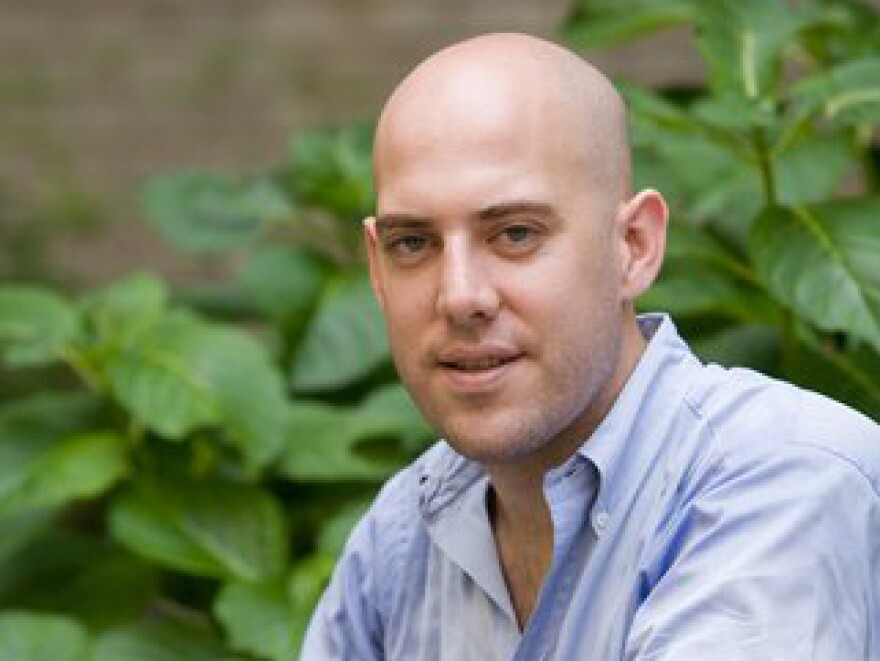With our free press under threat and federal funding for public media gone, your support matters more than ever. Help keep the LAist newsroom strong, become a monthly member or increase your support today.
Christopher Beha, On Faith And Its Discontents

In the novel What Happened to Sophie Wilder, writer Charlie Blakeman runs into his former college love after 10 years and finds out that she has converted to Catholicism. Charlie can't make sense of her conversion, but as he finds out more about Sophie's past, he sees her life is more complicated than he previously thought. When Sophie once again disappears, Charlie sets out to discover what has happened to her.
Author Christopher Beha "was interested in writing about a person of faith," he tells Fresh Air's Terry Gross, "while also writing about the attempt of someone who does not have that capacity for faith to try to understand it."
A former Catholic himself, Beha says, "I'm someone who was raised Catholic and was indeed a believing Catholic, not just a cultural Catholic by upbringing, who then lost his faith. And in lots of ways, faith became much more interesting to me once I didn't have it."
Beha is an associate editor at Harper's magazine. His essays and reviews have appeared in The New York Times Book Review and the London Review of Books. He is the author of The Whole Five Feet, a memoir about reading the 22,000 pages of the Harvard Classics 100 years after their original publication. What Happened to Sophie Wilder is his first novel.
Interview Highlights
On religion
"One of the things that I find dissatisfying about a lot of modern or contemporary versions of religion is the extent to which they're geared toward the therapeutic. If you look at, say, the Prosperity Gospel, religion is supposed to make you feel good about the things you naturally want already. And I'm interested in religion as a challenge. The Jesus bringing us 'not peace but the sword.' So I had an idea of having a character who is converted, but that conversion doesn't necessarily lead to peace, doesn't end her struggle — but rather leads to a new struggle."
On irony
"I read a lot of David Foster Wallace in college. People who are familiar with his work will know that [irony] is something he thought a lot about — the way that irony, which had once been a subversive gesture, had basically been co-opted. So it is very common to see what used to be corrosive literary irony used in television commercials, for example. And what once had a good purpose — to break down old, outdated norms — was not very good for building something back up in their stead and perhaps, had outlived its usefulness. This is all very broadly speaking. And then the struggle is: What comes next?"
On an author's responsibility
"There is a tendency for a lot of writers to think that the world, up to and including other people's suffering, exists to be their material. Now that's not to say that anytime you want to draw something from life, you need to get permission from the people involved, even if you intend to fictionalize it. But what I do think you need to do is you need to earn it on the page; you need to do something with it that makes meaning out of the experience, otherwise you're just being a scavenger."
On mortality
"I don't want to oversell the therapeutic values of literature, because I don't necessarily think that's what's most powerful about them. But certainly, to know that the problem of mortality is something that people have been struggling with for as long as they've been capable of speaking and thinking and writing down words, and to know that a huge portion of the output of the people struggling with that — the finest minds in human history — is available to us, that that's our heritage, is incredibly comforting to me, despite the fact that what they have to say on the topic is not particularly comforting as such."
Copyright 2023 Fresh Air. To see more, visit Fresh Air. 9(MDA1OTI3MjQ5MDEyODUwMTE2MzM1YzNmZA004))
At LAist, we believe in journalism without censorship and the right of a free press to speak truth to those in power. Our hard-hitting watchdog reporting on local government, climate, and the ongoing housing and homelessness crisis is trustworthy, independent and freely accessible to everyone thanks to the support of readers like you.
But the game has changed: Congress voted to eliminate funding for public media across the country. Here at LAist that means a loss of $1.7 million in our budget every year. We want to assure you that despite growing threats to free press and free speech, LAist will remain a voice you know and trust. Speaking frankly, the amount of reader support we receive will help determine how strong of a newsroom we are going forward to cover the important news in our community.
We’re asking you to stand up for independent reporting that will not be silenced. With more individuals like you supporting this public service, we can continue to provide essential coverage for Southern Californians that you can’t find anywhere else. Become a monthly member today to help sustain this mission.
Thank you for your generous support and belief in the value of independent news.

-
The L.A. County Board of Supervisors on Tuesday voted to declare immigration enforcement actions a local emergency.
-
Tens of thousands of workers across Southern California walk out over pay and staffing issues.
-
People in and around recent burn scars should be alert to the risk of debris flows. Typical October weather will be back later this week.
-
Jet Propulsion Laboratory leadership says the cuts amount to 11% of the workforce.
-
The rock legend joins LAist for a lookback on his career — and the next chapter of his music.
-
Yes, it's controversial, but let me explain.







